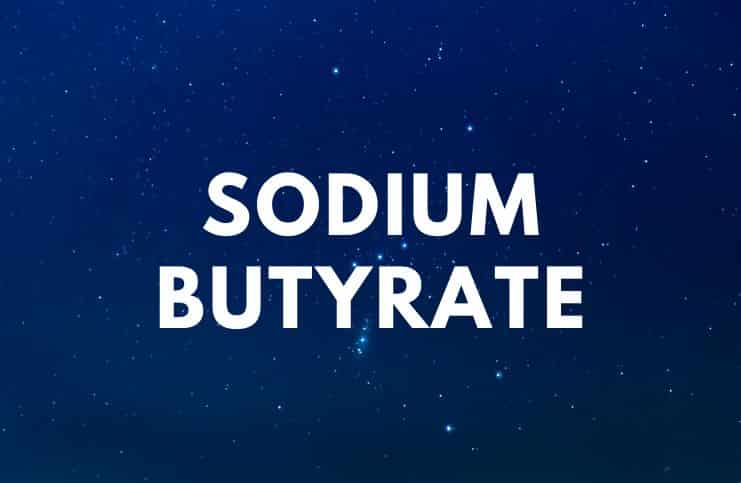Sodium Butyrate Side Effects:
Butyric acid, also called butanoic acid, is a fatty acid (with chemical formula – Na(C3H7COO)) that’s produced by anaerobic bacteria fermentation of dietary fiber. Fiber is basically carbohydrates that humans cannot digest.
Uses
There are many types of fiber that get “eaten” by the bacteria in different amounts and at different rates in our colon. This acid has been around in the mammalian gut for so long that the lining of our large intestine has evolved to use it as its main source of energy.
Sodium butyrate is the sodium salt of butyric acid, usually used in pharmacological studies.
Best way to increase levels of butyrate in the gut
The best method for someone to increase the amount of butyrate in their colon is to eat foods that are high in resistant starch and soluble fiber. These compounds act as nutrients for appropriate gut bacteria.
Tip – chronic inflammatory disorders, intestinal infections, stress, and use of antibiotics negatively affect the colonic microflora and may result in a notably reduced production of butyrate.
Health Benefits of Butyric Acid
It has many health benefits: it combats cancer, autoimmunity, and psychological disorders, and changes the epigenetics in our brain.
Inhibits the development of colon cancer
It is thought to be essential in promoting normal functioning colon cells, which could contribute to lowering the risk of colorectal cancer. The role in the body of this compound differs between cancerous and normal cells.
This is known as the ”butyrate paradox.” Butyric acid promotes healthy colonic epithelial cells and inhibits colonic tumor cells, but the mechanism is not well understood.
Furthermore, it has the capacity to influence gene expression, hence inducing early apoptosis in cancer cells (programmed cell death).
Depression
According to research, by 2020, depression may be 2nd to heart disease as a leading cause of death.
In 2015, a study at Universidade do Extremo Sul Catarinense, Brazil concluded that sodium butyrate showed antidepressant effects in maternal deprivation and chronic mild stress-treated rats, and this beneficial effect can be ascribed to its action on the neurochemical pathways related to depression.
Reduces LDL cholesterol
Cholesterol is a waxy, fat-like compound that your physical body needs. However, when you have too much cholesterol in your blood, it can build up on the walls of your arteries. This leads to atherosclerosis, a serious disease (usually with no symptoms) that increases the risk of heart disease and stroke.
This compound interacts with important genes that make cholesterol, probably reducing cholesterol production.
Improves memory
In a study published in 2011 by the Journal of Alzheimer’s Disease, this acid was found to improve memory function in an Alzheimer’s disease (progressive mental deterioration) mouse model when administered at an advanced stage of the disease.
Anti-inflammatory properties
According to a 2013 study, these anti-inflammatory properties may be partly associated with the capacity of butyric acid to support the development of immune cells that block inflammation in the lining of the end gut in mice.
In addition, a 2013 study by Japanese researchers examined its role in immune system function and established that butyric acid promotes immune system T-regulatory cells.
These cells maintain order in the immune system by enforcing a dominant negative regulation on other immune cells.
Weight loss
The number of microorganisms in the gut can affect energy regulation and nutrient absorption, therefore, influencing the development of obesity.
Side Effects of Sodium Butyrate
There are no known side effects.
Butanoic Acid: Food Sources
The quantity of butanoic acid formed in the gut depends on which bacteria live there and on how much resistant starch and soluble fiber is present. Resistant starch is starch that we are unable to digest or that we digest very slowly.
Depending on how foods are prepared, a number of resistant starch changes. For instance, allowing a banana to ripen will degrade the resistant starches and turn them into regular starches.
Good sources of dietary fiber include oatmeal, oat bran, barley, carrots, turnips, radishes, broccoli, apples, mangoes, sweet potatoes, pineapple, papayas, pears, durians, almonds, walnuts, hazelnuts, Brazil nuts, pecans, seeds (especially flaxseeds, sesame seeds, sunflower seeds, and chia seeds), legumes (chickpeas, lentils, red kidney beans, baked beans, navy beans, adzuki beans, soybeans) and many other types of vegetables and fruits.
By eating daily fruits and vegetables, you are not just allowing the good bacteria you have to make butyric acid, you’re actually promoting their growth.
Tip
Supplementation with this fatty acid may not be the best method to increase your levels of short-chain fatty acids.
Due to the fact that these supplements are absorbed before they reach the colon, commonly in the small intestine, this signifies that all of the benefits for colon cells will be lost.
It is wiser to follow a high-fiber diet which has many health benefits in reducing the risk of colon cancer, type 2 diabetes, obesity, stroke, and cardiovascular disease, making it a widely recommended healthy diet.
Note
Some types of cheese, butter, and cow’s milk also contain small amounts of butyrate. However, dairy products are a rich source of saturated fats, which are known to adversely affect the heart.
READ THIS NEXT:
Rutin Health Benefits and Adverse Effects
References https://www.ncbi.nlm.nih.gov/pubmed/24226770/%5d https://www.sciencedaily.com/releases/2013/11/131113132202.htm https://www.ncbi.nlm.nih.gov/pubmed/23615664 https://www.ncbi.nlm.nih.gov/pubmed/25274213
